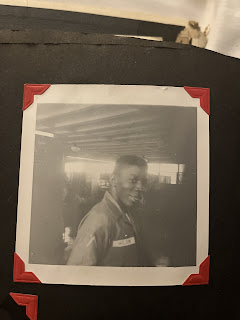Your Voice is Important
So for class this week, we read Michelle Alexander's outstanding work, The New Jim Crow: Mass Incarceration in the Age of Colorblindness and as luck (or God) would have it, Alexander was also coming to speak at Columbia and receive the Annual Mamie and Kenneth Clark award and present the memorial lecture. Imagine my excitement.
During the talk, which consisted of Alexander in conversation with Dr. Carl Hart of the Psychology Department, giving her insights on doing "the work" and changes that need to take place within society so that we can deconstruct the system rather than attempting to operate within it. She discussed the following in more detail than I will here:
- You have a duty to care. For people. In general. You have a duty to insure everyone has an equal opportunity to be their best. This means you must go out of your way to make opportunities available to everyone and not just someone.
- Work on getting white allies to do more than just "care" about POC issues or "think kindly" about the situations.
- Concerning activism and learning experiences, don't be defensive or afraid to acknowledge your complicity in the system. We all are or have been guilty of this in some sense.
- We need to end the idea of "white innocence." White people need to admit their criminality as well. Talk about the times where you did drugs, whatever they were, the time you stole from a liquor store or Claire's or Tilly's. Discuss all the times they got a pass. Decry the idea that Black people are the only ones who break the law.
- Just as in the #MeToo movement, the aim is really that ""Women should be believed," in this modern day Civil Rights movement, the reality to promote is that "Black people speaking on their experienced discrimination should be believed."
- Mental health needs to be more properly addressed on both a state and federal level. So many of those incarcerated actually are in dire need of mental health assistance.
- And finally, America needs to be re-evaluated. Mass incarceration is a source of both literal and social control. We need to move beyond the "resistance" mentality and understand that we're trying to birth a new kind of nation.
I've included a link some key takeaway notes from the book itself but I want to talk about something else that happened at, or rather after, this talk.
It was announced that there would be a reception for Alexander next door and immediately I went into a social-anxiety based panic. Apparently I operate well in these situations but getting myself there always gives me so much anxiety I almost don't go. This time, I forced myself and I'm so glad I did. I consider myself to be in the consciousness-raising business but the draw of activism and doing more is never far from my mind. What more could I be doing to further the causes that are important to me? What about the people who are organizing and out in the streets making change happen in real-time? I decided to ask Alexander for her thoughts and advise or recommendation if she had any. She smiled warmly at me and said, "I think that's work enough in and of itself." Rather than misquote her because I got so happy/nervous I know I don't remember what she said word-for-word, I'll paraphrase. She said that consciousness-raising was important work as well and not to feel bad about it because not everyone can be out physically in the streets doing activism in that way. Consciousness-raising is activism as well and it's necessary, someone has to do it. That's basically what she considers her work to be so I shouldn't feel bad. And while I know I'll still feel the tug of wanting to do more, I can rest a little easier knowing that the "work" I do is in fact considered "work" too. While giving only your "thoughts and prayers" is never enough, not everyone has the ability, time or resources to be out marching every day for one cause or another and fundraising and running for office. Sometimes, it's okay that you talk about and spread knowledge. One particular aspect that she stressed was being okay with being and getting uncomfortable. She said sometimes you have to be in that space and you need to be okay with it which is ironic considering the amount of time I find myself in that space already. Then I shook her hand, thanked her, and told her to stop letting all these people block her from going inside the reception hall (a line had formed behind me with her standing there awkwardly, semi-blocking the door).
The morals of this story are as follows:
- Idolizing people gets very tricky but speak to people you find inspiration in and ask for their advice whenever possible. You never know when you'll get the opportunity again
- Have a question in mind before you walk up instead of just word-vomiting. It's helpful to have something to actually say instead of wasting their time until you (maybe) run into one
- Order yourself some personal business cards (order me some while you're at it)
Until next time,
xx
 |
| Michelle and Carl having a chat |

Comments
Post a Comment